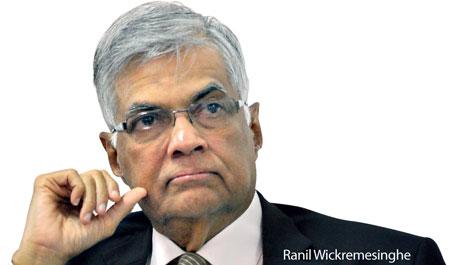- Urges for good fiscal and monetary policy that will enable SL to repay loans
- Says not enough done on debt repayment front; says, “We have to put it off.”
- Highlights need for SA countries to get their act together without expecting assistance from developed nations
By Shabiya Ali Ahlam
Former Prime Minister Ranil Wickremesinghe called for a major restructuring of the Sri Lankan economy as a financially challenged future is foreseen for the country, and despite economic challenges faced, he stressed it was time for the island nation to learn to look after itself.

“We have problems. We must remember that if we don’t resolve this and take necessary measures, it is going to become difficult. That means we need good fiscal policy and good monetary policy, which will enable us to repay loans,” the former premier told a webinar organised by the International Chamber of Commerce Sri Lanka (ICCSL).
He added that the need of the hour is fiscal space, which can only be obtained through new thinking.
According to Wickremesinghe, not enough is being done in the area of debt repayment. To address the concerns revolving debt servicing, “we have to put it off,” he told the webinar that was joined by ICC Chairman Paul Polman and other senior representatives within the South Asian region.
“There is US$ 1 trillion in the IMF which is not enough. The IMF’s rapid financing instrument will give 100 percent of quota and that is not enough. We need about 500 percent. We need more resources as far as our part of the world is concerned. That is where we have to campaign first. To help people and governments that need money,” the former Prime Minister said.
Wickremesinghe stressed the need for “big” restructuring of the economy as the conditions of 2021 will not be the same as those of 2019. He asserted that without radical restructuring, the country would struggle to move forward in the post-COVID scenario.
He further opined that it is time for Sri Lanka and other South Asian nations to look at solving their own issues without expecting assistance from developed nations.
“The need for relief by our economy is a battle we have to now take on with the rest of the developed economies. We can’t expect much from them because they are just starting to look after themselves,” he said.
Last week, President Gotabaya Rajapaksa called for “unconditional” support from international lenders to help uplift middle-income nations from the implications of the ongoing crisis.
The President pointed out that multilateral and bilateral official creditors have a “special responsibility” to be innovative in helping the developing world to revive their economies.
Meanwhile, deliberating on the topic of developed nations assisting developing countries,Dr. Nadeem Ul Haque of Pakistan Institute of Development Economics said South Asia should stop calling itself vulnerable and look at getting its house in order.“We are not vulnerable. We are responsible for our own mess and I think we should spend to clean our own house and not look at donors for funding,” said the economist.
“When will we rethink our strategies? Our strategies are overly nationalistic. We have spoken about this many times in Sri Lanka and Pakistan. Our strategies are overly bureaucratic and are overly regulated. Our financial markets are a disaster, not because of COVID but because we are heavily overrated,” he said. Dr. Haque told the webinar that the South Asian region should look at reimagining its national architecture to reap the benefits of economic development.
 “We have problems. We must remember that if we don’t resolve this and take necessary measures, it is going to become difficult. That means we need good fiscal policy and good monetary policy, which will enable us to repay loans,” the former premier told a webinar organised by the International Chamber of Commerce Sri Lanka (ICCSL).
“We have problems. We must remember that if we don’t resolve this and take necessary measures, it is going to become difficult. That means we need good fiscal policy and good monetary policy, which will enable us to repay loans,” the former premier told a webinar organised by the International Chamber of Commerce Sri Lanka (ICCSL).